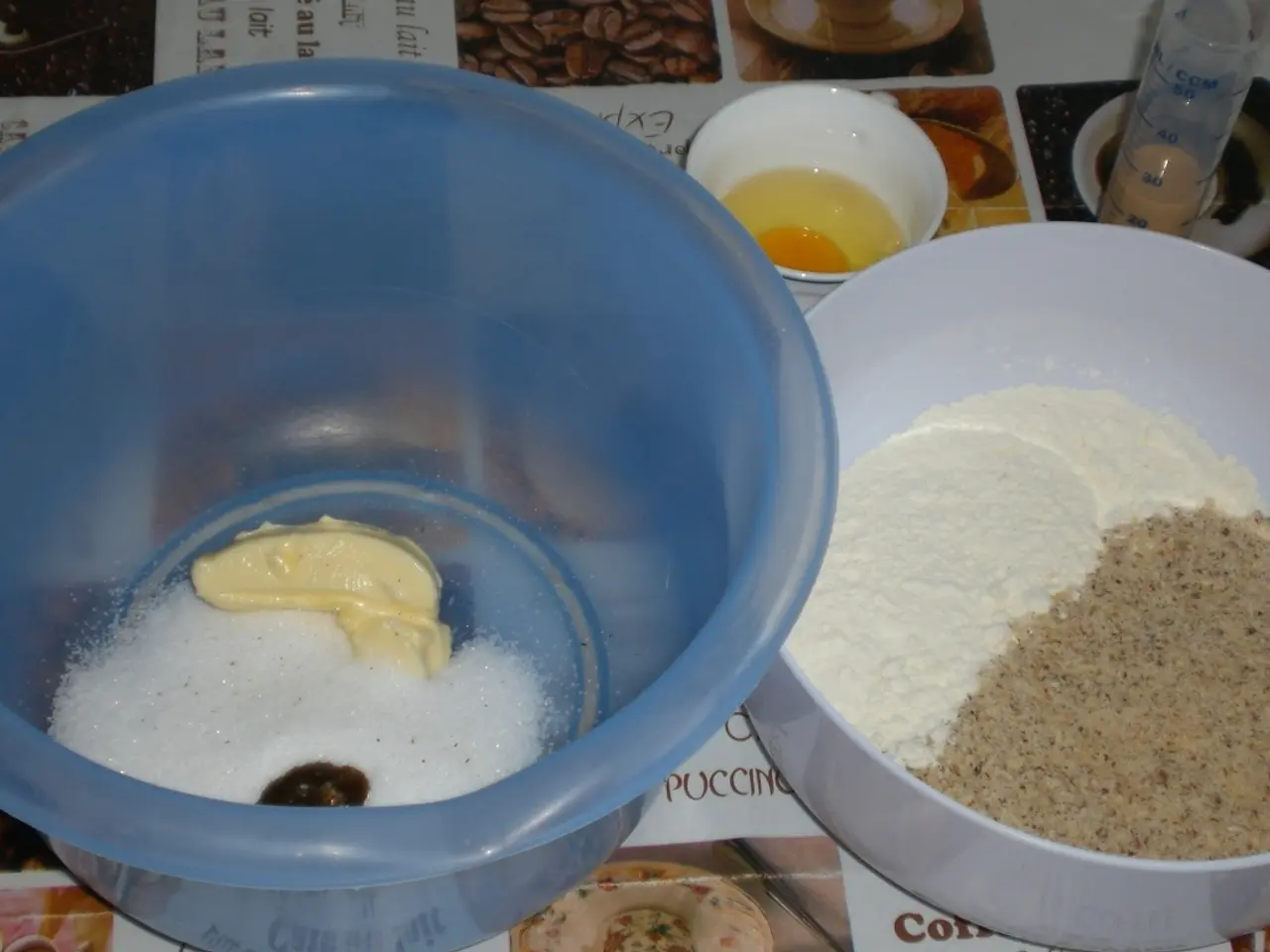Avoiding and selecting milk options for ulcerative colitis management
For individuals living with ulcerative colitis (UC), managing flare-ups can be challenging. Here's a guide to help you navigate your diet during these difficult periods.
Foods to Avoid During a UC Flare-up
During a flare-up, it's important to steer clear of foods that irritate the colon and worsen symptoms. These include:
- High-fiber vegetables like broccoli and cauliflower, and raw vegetables, especially those with skins or seeds, as they can irritate the gut lining.
- Fruits with skins or seeds, and raw fruits—due to their fiber content.
- Fried and highly processed foods, including fast foods, deep-fried snacks, frozen desserts, and processed meats (e.g., sausages, hot dogs), as they worsen inflammation and digestion.
- Red meat and heavy, spicy, or heavily seasoned sauces, which can trigger symptoms.
- Sugary foods and excessive dairy, particularly if lactose intolerant, since they may worsen symptoms.
- Whole grains and high-fiber breads (e.g., whole wheat, bran), which are harder to digest during flares.
Foods to Consume During a UC Flare-up
In contrast, during a flare-up, it's beneficial to consume gentle, low-fiber, and easy-to-digest foods. These include:
- Lean protein sources like poached chicken breast, turkey, fish (e.g., canned tuna, grilled salmon), eggs (boiled, poached, or baked), tofu, and mild chicken sausage.
- Low-fiber fruits such as bananas, peeled apples or pears, mango, watermelon, and cooked fruits.
- Cooked vegetables like carrots, green beans, pumpkin, and sweet potato puree, which are easier to digest than raw vegetables.
- Low-fiber grains like white rice, white bread (e.g., sourdough), saltine crackers, and gluten-free grains like quinoa.
- Broth and electrolyte drinks (low-sugar varieties) help with hydration.
- Yogurt or kefir (unsweetened) can provide probiotics and aid digestion if tolerated.
- Smooth nut butters such as smooth almond butter add healthy fats and protein without irritating the gut.
Additional Notes
- During severe flares, a liquid diet may be advised to minimize irritation and support healing.
- Staying hydrated is crucial due to frequent diarrhea and the risk of dehydration.
- Individual trigger foods vary; monitoring personal reactions is important.
- Stress management and exercise also help reduce flare-ups and improve well-being.
This diet approach focuses on reducing gut irritation and inflammation while providing adequate nutrition to support healing during UC flare-ups.
Further Considerations
- An anti-inflammatory diet may include fish, fruits and vegetables, whole grains, lean meats, eggs, legumes, and plain dairy products such as lactose-free yogurt and kefir.
- Probiotic drinks such as kefir may help some people with UC.
- During a flare, people may want to avoid fried and spicy foods, alcohol, drinks containing sweeteners, whole grain products, most dairy products, and raw, unpeeled fruits and vegetables.
- People may help avoid worsening UC symptoms by eating soft, bland foods during a flare, such as white pasta or rice, low fiber fruits, and fully cooked vegetables without skin.
- UC is a form of inflammatory bowel disease (IBD).
- A person with UC can try staying adequately hydrated with water, broth, or a rehydration solution, eating meals on a regular schedule, having 4 to 6 smaller meals a day rather than 3 larger ones, keeping a food journal during a flare to help identify trigger foods, using low fat cooking techniques such as boiling, grilling, or steaming, and drinking slowly and avoiding using a straw, which can cause gas.
- It is important for someone with UC to follow a nutritious, well-balanced diet.
The Crohn's and Colitis Foundation advises that people with UC work with a doctor or dietitian to develop a personalized meal plan that ensures adequate nutrients.
Individuals living with ulcerative colitis (UC) might find managing flare-ups a challenge, but navigating their diet can be easier with suitable choices. During a flare-up, steer clear of high-fiber vegetables like broccoli and cauliflower, raw vegetables, fruits with skins or seeds, fried and highly processed foods, red meat, spicy or heavily seasoned sauces, sugary foods, whole grains, and dairy if lactose intolerant. Instead, concentrate on consuming lean protein sources, low-fiber fruits, cooked vegetables, low-fiber grains, broth, electrolyte drinks, yogurt or kefir (if tolerated), and smooth nut butters. During severe flares, a liquid diet may be advised. Staying hydrated is critical due to frequent diarrhea and the risk of dehydration.
An anti-inflammatory diet may include fish, fruits and vegetables, whole grains, lean meats, eggs, legumes, and plain dairy products such as lactose-free yogurt and kefir. Probiotic drinks like kefir may help some people with UC. During a flare, it's advisable to avoid fried and spicy foods, alcohol, drinks containing sweeteners, whole grain products, most dairy products, and raw, unpeeled fruits and vegetables. Soft, bland foods like white pasta or rice, low-fiber fruits, and fully cooked vegetables without skin can be helpful in avoiding worsening UC symptoms.
For an individual with UC, staying adequately hydrated with water, broth, or a rehydration solution is essential. Eating meals on a regular schedule, having 4 to 6 smaller meals a day instead of 3 larger ones, maintaining a food journal during a flare to identify trigger foods, using low-fat cooking techniques like boiling, grilling, or steaming, and drinking slowly and avoiding using a straw are some practices that can help manage UC symptoms. A nutritious, well-balanced diet is vital for someone with UC.
According to the Crohn's and Colitis Foundation, people with UC should work with a doctor or dietitian to develop a personalized meal plan that ensures adequate nutrients. This diet approach aims at reducing gut irritation and inflammation while providing adequate nutrition to support healing during UC flare-ups.
Treating various medical conditions such as chronic-diseases like chronic-kidney-disease, COPD, type-2-diabetes, cancer, respiratory-conditions, digestive-health issues, eye-health concerns, hearing problems, neurological-disorders, autoimmune-disorders, and skin-conditions often requires the guidance of a professional in the science of human health, be it a nutritionist or a medical professional at a workplace-wellness center.
The healthcare industry is evolving, with a growing emphasis on clinical research, environmental-science, finance, and technology like fintech, real-estate, robotics, wind energy, space-and-astronomy, oil-and-gas, aerospace, and artificial intelligence. As the medical landscape changes, so does the need for diverse entrepreneurship in areas like retail, public-transit, automotive, small-business, banking-and-insurance, investing, transportation, leadership, diversity-and-inclusion, and aviation.
In conclusion, managing UC flare-ups involves adjusting one's diet and seeking guidance from healthcare professionals. Additionally, understanding various industries is key to realizing thriving and inclusive business environments in the era of climate-change and renewable-energy.








